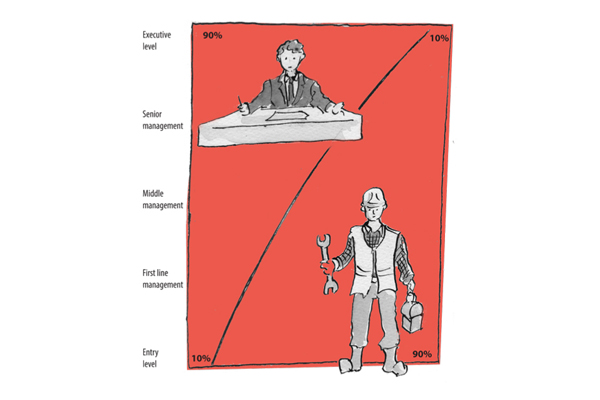Specialists – engineers, doctors, teachers, architects etc – often find themselves promoted not just for their technical skill but because they’ve become indispensable voices in their field.
But what happens when climbing the ladder shifts the job away from hands-on work and into people management? For many, this transition is disorienting, especially when the work they loved becomes a flurry of interruptions, team issues, and processes that feel worlds away from their “real job.”
Are you feeling the shift from specialist to leader?
If this sounds familiar, you’re not alone. Here are common refrains from people newly promoted to management:
- “I never get time to do my real job without interruptions.”
- “All this ‘people stuff’ doesn’t come naturally to me.”
- “I just want to focus on my work, not others’.”
- “Why does my team need to discuss things endlessly?”
In scaling businesses, thriving in a leadership role means reframing these sentiments and understanding that, at this level, it’s not only about what you can do yourself but what you can inspire others to achieve. Let’s take Sheila’s story as an example:
Sheila, a high-performing investment analyst, had always been able to lose herself in hours of research and analysis. Her firm valued her contributions so much that they promoted her to associate director, making her responsible for a small team of analysts.
At first, the promotion felt like a win, but before long, Sheila realised that her days were filled not with research but with constant interruptions – questions, meetings, and team issues that kept her from the quiet work she loved.
Sheila started to resent the interruptions. Why couldn’t her team just get on with their tasks? Why did they need her input on everything? From her point of view, it felt like she was being prevented from doing her ‘real job’.
What’s really happening here?
For Sheila, moving into a leadership role means accepting two big changes. First, a team isn’t a group of isolated individuals; it’s an organism that thrives on open communication. Sheila’s team needed her guidance, not out of insecurity, but because good teamwork relies on collaboration. What felt like “chit chat” was actually the pulse of a team sharing information and aligning on common goals.
Second, Sheila’s perspective on her role was outdated. She saw herself as an analyst with a ‘bonus title’, rather than a leader with a distinct set of responsibilities. Her promotion wasn’t just about rewarding her expertise; it was a shift into becoming a coach, guide, and facilitator for her team – a position she wasn’t prepared for nor even aware she needed to embrace.
From specialist to multiplier: a mindset shift
In growing organisations, many leaders mistake career progression as simply ‘doing what you’ve always done, but at a higher level’. But effective leadership is a complete change in focus. While your expertise got you noticed, your ability to uplift others is what will make you a successful manager. Here are some suggestions:
1. Become a ‘multiplier’, not just a ‘doer’.
As a specialist, your value was in your individual contribution. As a leader, your impact multiplies when you help your team grow. This doesn’t mean abandoning your expertise; it means using it to develop others, creating a ripple effect of success throughout your team.
2. Reframe ‘interruptions’ as ‘essential team dialogue’.
What felt like interruptions to Sheila were, in fact, team members doing their job by keeping the lines of communication open. By setting aside dedicated time for questions, discussions, and problem-solving, you build trust and enable smoother workflows.
3. Redefine career development.
In leadership, growth is less about technical mastery and more about influence, impact, and legacy. Instead of seeing this transition as a loss of status, view it as an opportunity to expand your professional impact.
4. Embrace the role of coach.
You’ve moved from being the ‘expert’ to being the ‘guide’. Effective leaders ensure that each person on their team has the resources, support, and encouragement to excel. It’s not about doing everyone else’s work; it’s about helping them do their work better and supporting them on their professional journey.
Becoming a custodian: embracing the shift
Growing organisations need leaders who understand that being a manager is a completely different job from being a specialist. Many leaders cling to their technical expertise because it’s what got them promoted. But as the company grows, the leaders who thrive are those who can shift from being an individual contributor to a facilitator of others’ success.
Like Sheila, leaders who resist or misunderstand this shift miss an essential opportunity to make a lasting impact. When you help others grow, you’re not just advancing your team – you’re leaving a legacy that goes beyond individual contributions and moves toward creating a thriving, dynamic organisation.
Ready to embrace your new role?
Transitioning from operator to manager doesn’t mean losing what made you valuable in the first place; it means enhancing it in a new way. By lifting others, you amplify your impact and leave a positive imprint on your organisation’s future. Embrace the journey, the team, and the change – it’s how great leaders make a difference.
